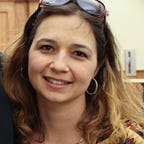Listen Them Into Existence
Listen people into existence.
When in doubt, delight in their face.
Healing racism is about real people that end up loving each other and being in a relationship.
These are some of my notes from a workshop on listening as an act of inclusion and social justice that I hosted last month at Oakland University with the inspiring founder and director Traci Ruble and educator Tecca Thompson of the Sidewalk Talk project.
They shared stories with one another, listened, and reflected to each other what they witnessed. In the process, we accompanied the speakers on the journeys of their feelings, how their bodies felt in the middle of a traumatic event and in processing it afterwards, and we heard questions about what helped one heal.
We did not hear interruptions. We did not hear relating to one another’s experiences.
We saw space to just be, without judgement, without pushing for more, and with lots of recognition, silence, and — because covid — lots of virtual hugs.
I am reflecting on this workshop nearly two weeks later because I am in need of receiving this type of listening today and am feeling the urge to offer this listening at the same time to my friends and family in Minnesota.
I’m trying to set some of the (white) guilt and (white) savior complex to the side for a few minutes because I feel there is an important urge underneath it all to contribute to healing.
Two particular quotes are swirling inside of me right now.
The oneness of humanity… is a statement of principle and an assertion of the ultimate goal of human existence on the planet.
In no other country is the promise of organic unity more immediately demonstrable than in the United States because it is a microcosm of the diverse populations of the earth.
Both of these statements reached me through the National Center for Race Amity and are reliant on the teachings of the Baha’i Faith, of which I am a member. They are important right now because, as I feel unprepared to radically love one another, “to delight in their face,” I realize I need to pivot and draw from what is constructive and joyful. Any other path right now is inadequate, provokes more rupture, more disunity, more confusion, and more loss.
I realize the strength of the argument that people have always had war, dissent, division, and hierarchies. The first quote doesn’t argue for the opposite, but it emphasizes that, beyond a principle, realizing our oneness is the ultimate goal. Radically loving all is the ultimate goal. We cannot achieve reconciliation without truth.
I have pondered on this too often in the last year, as so much discord and hot emotions have led our communities to feel — and be — at odds. The pandemic, racism, vilifying and skewering one another for our choices and beliefs, racism, elections, riots at the Capitol, racism again… “In no other country…” This isn’t about how special the U.S. is — as an immigrant I am not particularly fond of the promise of the American Dream and how exclusionary that has ended up being, nor oblivious to the dangerous and imbalanced consequences of the U.S. as a world power with very narrow interests.
This is about how we are an opportune lab to work this out. This is the room where it happens.
At the same time as I offer theses prompts for bridging polarizing conversations, I will admit how inadequate and underprepared I feel, and how short I fall in being there. But let’s try it nonetheless:
Listen the family of Duante Wright into existence — #saytheirname. Listen the family of Kim Potter into existence.
Delight in the faces of those protesting who feel anger and pain. Delight in the faces of police officer families who feel betrayed and abandoned.
Final notes — because I am struggling seeing these sentences side by side. First of all, this isn’t about all things being relative. This isn’t about let’s all get along and share our toys on the playground. This is about speaking truth, owning up to mistakes and fissures in the deepest corners of our hearts, communities, institutions, and systems. This is about true justice.
Second and lastly, I am not the first to come up with this. I rely on the wisdom of many before me who have recognized we are lonely and unheard and disconnected. I’m going to say it again: “Healing racism is about real people that end up loving each other and being in a relationship.” I’m listening.
Originally published at https://adinaportfolio.wordpress.com/ on April 13, 2021.
